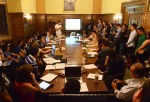At the Undergraduate Students Association Council meeting Tuesday, councilmembers showed an ability to effectively navigate contentious issues when they unanimously approved a resolution that could have split them along slate lines.
Late into the evening, they discussed a resolution to address student concerns about Janet Napolitano’s appointment as UC president without shutting the door on a dialogue with the new president. The most hotly debated phrase in the original text of the resolution, which expressed “no confidence” in the new president until she met a list of student demands, was removed.
The newly approved resolution marks the start of the outreach USAC must carry out with the UC Office of the President. But USAC should work to maintain a constructive dialogue with UCOP. The removal of the “no confidence” phrasing at Tuesday’s meeting represents a good trend in the direction of cooperation, and the council must preserve that spirit of dialogue.
It is possible to let UCOP know about student discomfort regarding Napolitano’s appointment without shutting down opportunities to work with her on relevant student concerns. USAC should look to continue the constructive tone of the revised resolution rather than the combative feel of the original text.
This is especially important for External Vice President Maryssa Hall, one of the authors of the original resolution, who must now act as UCLA’s primary point of contact with UCOP.
Maintaining a productive relationship between our student government and the University headquarters in Oakland is extremely important given that USAC is the primary link between the student body’s various concerns and the UC administration.
In addition to keeping these lines of communication open, USAC must reach out to the various segments of campus in order to adequately relay the student body’s interests and concerns.
The resolution, which seeks to do just that, is a symbolic document that holds little actual sway. Now that a symbolic step has been taken, the council must work to consistently communicate with the Office of the President in a more practical way.
The original resolution text, drafted by Hall, General Representative Lizzy Naameh, Student Wellness Commissioner Savannah Badalich and Cultural Affairs Commissioner Jessica Trumble, would have disparaged Napolitano when she had just taken office – not the best way to promote open dialogue.
Maintaining effective channels of communication is especially important because while the Office of the President always reads the texts of student government resolutions, UCOP has no set policy for how to respond to resolutions like the one passed on Tuesday, said Dianne Klein, a spokeswoman for the Office of the President.
Because there is apparently no institutional structure in place to respond to student demands and concerns regarding UCOP, students cannot rely on formal resolutions alone to make their statement.
That means USAC must extend its outreach efforts across campus to properly gauge every community’s concerns and make them known to the UC administration.
Enacting a council-wide campaign to solicit and address student concerns about and suggestions for the presidency is necessary to promote a productive dialogue with UCOP.
Since Napolitano’s appointment this summer, many students have been vocal about their opposition to her presidency, both because of her past in the Department of Homeland Security and because of the closed-doors process of her selection.
But no matter what particular issue students at UCLA think the president should prioritize, and no matter what their particular concerns with Napolitano are, it is her responsibility to represent the needs of her student constituency. In turn, it is USAC’s job to make sure she knows about those needs.
This type of advocacy has already been employed outside of USAC.
Following her appointment, the University of California Student Association put a survey up on its website called, “What do YOU think about Janet Napolitano becoming the next UC President?” The platform allowed students to put forward issues for the UCSA to tackle, and USAC should emulate this model.
Any opinion of Napolitano – good or bad – and any wish for her to respond to specific student needs, must be vocalized over and over again by affected students as well as by their representatives in Kerckhoff Hall.

It’s sad to see this degree of conciliatory tone being applied to our relations with UCOP. As an academic community, our first concern should have been taking a principled stance instead of equivocating to power and privilege. Ultimately, this backtracking legitimizes the strongly held nativist and neoliberal policies of this incoming UC President. Voting no confidence on Napolitano wouldn’t have shut the door of dialog, but rather would have defined the dialog on the community’s terms.
If there’s one thing that decades of activism have taught me it’s this: being nice to your oppressor doesn’t keep them from oppressing you.
Yes, let’s “dialogue” with someone who has thrown well over a million people in military prisons for nothing but issues with paperwork. (I’m speaking, of course, of her use of ICE thugs to kick in doors and violently kidnap undocumented people even if they’ve done nothing wrong).
In a just world Napolitano would be frog-marched in shackles to the dock at The Hague and put on trial for her crimes against humanity committed during her abject tenure at DHS/ICE. Instead, she gets a cushy position that she is woefully unqualified for.